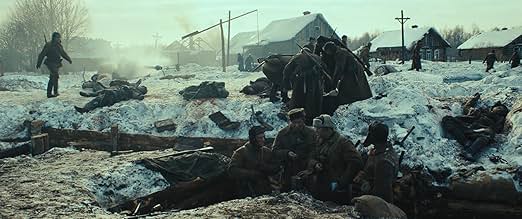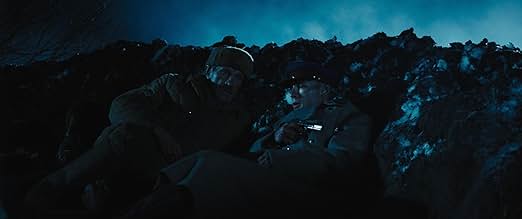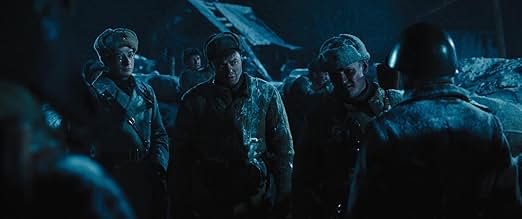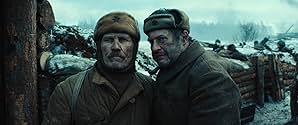AVALIAÇÃO DA IMDb
6,1/10
1,4 mil
SUA AVALIAÇÃO
Na 2ª Guerra Mundial, após vários meses de conflito, o Exército Vermelho finalmente derrota o inimigo, mas às custas de enormes perdas. Esgotados, os soldados aguardam resgate, mas o quartel... Ler tudoNa 2ª Guerra Mundial, após vários meses de conflito, o Exército Vermelho finalmente derrota o inimigo, mas às custas de enormes perdas. Esgotados, os soldados aguardam resgate, mas o quartel-general ordena que eles mantenham a região.Na 2ª Guerra Mundial, após vários meses de conflito, o Exército Vermelho finalmente derrota o inimigo, mas às custas de enormes perdas. Esgotados, os soldados aguardam resgate, mas o quartel-general ordena que eles mantenham a região.
- Direção
- Roteiristas
- Artistas
- Prêmios
- 1 indicação no total
Daniil Voropaev
- Sgt. Lavrov
- (as Danila Voropaev)
- Direção
- Roteiristas
- Elenco e equipe completos
- Produção, bilheteria e muito mais no IMDbPro
Avaliações em destaque
The rating on this one is baffling as it is clearly undeserved. This movie captures the Eastern Front very well, more so than many other Russian movies I have so far seen. If you liked 1993's Stalingrad, you will like this one.
Don't look at the ratings and comments here. It's a nice experience, the movie captured me the whole time. You won't regret watching it.
At last a real good Russian war movie, about the Great Patriotic War, a subject rarely close to real, actual events. There are batches of garbage propaganda stuff, where the Germans are always shown as idiots - idiots who provoked more than 25 millions deaths among the Russian population.....Here, the focus is on the Political Commisars, the Politrouks, who killed anyone who hesitated to fight. This point of view was rarely spoken in Russian movies. In this film, the enemy is maybe more them than the Germans. Political commissars and their bloodthirsty decisions, who ordered the deaths of thousands of soldiers only to take a simple hill. For Staline and his gang, the human life of their own fellows was nothing. They were more than Germans; one Nazi for one hundred Russians. An unbalanced fight. I have always found weird and not logical that people defending their life, freedom and homeland - the Russians - needed Political commissars to prevent them to desert.....The Nazis did not in Russia; maybe for obvious reasosn though. Where a deserter would have been, among the "Untermenschen", slavic "under men'; they were safer in the middle of their own "kameraden'...So, to summarize, I highly recommend this feature.
The opening battle scene was good but suffered from war movie clichés, like having a guy drag another to safety only to find half his body missing. They also have those stock characters, the scavenger, the harsh Commissar, and the heroic, square jawed commander. But as the movie progresses, the actors settle into their roles. The commander is especially likable.
The movie is well structured. After the opening battle there is a tense pause before the German counter-attack. This gives the actors time to show us the state or the Red Army in 1942. We see the tension between the regular army and the Commissars. All war movies glam up battle scenes but it was less than a typical American production.
The behavior of the Commissars is portrayed negatively but we hear enough to understand why they identify so strongly with the state. This does not justify them but it lets you see them as humans who took a wrong turn. The Commissars have logical, if flawed, reasons for their decisions as their heavy handedness creates hostility. After a tense argument, a Commissar refuses to send help to a unit that just took a position, blurting out, 'whatever we send them will be a total loss'. He assumes the officer is being emotional but he is not allowing the army to prove what they could do given resources at critical times. I thought this interplay was well done but you have to look for it, this good writing.
They used the church imagery effectively. You see it wherever they went. You see them standing next to a wall decorated with icons and in a basement. Religious themes can feel forced but here it felt natural. Even the Commissars, famous for their atheism, chose to ignore its presence rather than fight it. You could see this going through their minds with one uncomfortable glance. The Church belonged there the Germans did not. When a German emerged from an Orthodox church at night with a flame thrower, it was chilling. It was as if they were assaulting the essence of the town.
The Germans were a better foil here than in American movies. In U. S. movies they are portrayed as evil but incompetent. This detracts from their seriousness. Here they are deadly and their presence is like a dark cloud.
Except for a few common war movie tropes, this was a very good movie.
The movie is well structured. After the opening battle there is a tense pause before the German counter-attack. This gives the actors time to show us the state or the Red Army in 1942. We see the tension between the regular army and the Commissars. All war movies glam up battle scenes but it was less than a typical American production.
The behavior of the Commissars is portrayed negatively but we hear enough to understand why they identify so strongly with the state. This does not justify them but it lets you see them as humans who took a wrong turn. The Commissars have logical, if flawed, reasons for their decisions as their heavy handedness creates hostility. After a tense argument, a Commissar refuses to send help to a unit that just took a position, blurting out, 'whatever we send them will be a total loss'. He assumes the officer is being emotional but he is not allowing the army to prove what they could do given resources at critical times. I thought this interplay was well done but you have to look for it, this good writing.
They used the church imagery effectively. You see it wherever they went. You see them standing next to a wall decorated with icons and in a basement. Religious themes can feel forced but here it felt natural. Even the Commissars, famous for their atheism, chose to ignore its presence rather than fight it. You could see this going through their minds with one uncomfortable glance. The Church belonged there the Germans did not. When a German emerged from an Orthodox church at night with a flame thrower, it was chilling. It was as if they were assaulting the essence of the town.
The Germans were a better foil here than in American movies. In U. S. movies they are portrayed as evil but incompetent. This detracts from their seriousness. Here they are deadly and their presence is like a dark cloud.
Except for a few common war movie tropes, this was a very good movie.
I think when making the war movies, especially the WWII movies, the Russian movie industries is the very best, then the South Korean. Sorry, Hollywood is even worse than the Chinese movie makers. But the Chinese movies got a propaganda problem which is seriously censored by the CCP government. The modern Russia, on the contrary, when they made movies about WWII, besides to portray how bravely the Russian soldiers and the common citizens fought against the Nazi Germany invasion, they also used the opportunity to mock the ridiculous Soviet Russia's tight control of their military forces, like the CCP now controls everything. If you watch this movie, you would find such cynical mockery to their former Soviet Communist Party's stupidity. It asked the Russian soldiers to fight for their motherland, but at the same time, punishing those who were against their cruel communist policies.
I absolutely agreed with what the sole review said about this movie, this movie indeed captured me the whole time. The battle scenes are top notched directed, acted, edited, even the music is perfectly synchronized and so relevant with the battle scenes and all the situations. This movie is indeed one of the Best 2nd World War movies. Strongly recommended.
I also would like to recommend the following classic Russian movies for you; they are all great movies, most are about WWII:
Ballad of A Soldier (1959), The Forty-first (1956), The Cranes Are Flying (1957), Battle for Sevastopol (2015), Zvezda (The Star) 2002, The Tank Battalion (1991), Andrei Rublev (1966), Battalion (2015), Blizzard of Souls (The Rifleman) 2019, Fortress of War (2010)
I absolutely agreed with what the sole review said about this movie, this movie indeed captured me the whole time. The battle scenes are top notched directed, acted, edited, even the music is perfectly synchronized and so relevant with the battle scenes and all the situations. This movie is indeed one of the Best 2nd World War movies. Strongly recommended.
I also would like to recommend the following classic Russian movies for you; they are all great movies, most are about WWII:
Ballad of A Soldier (1959), The Forty-first (1956), The Cranes Are Flying (1957), Battle for Sevastopol (2015), Zvezda (The Star) 2002, The Tank Battalion (1991), Andrei Rublev (1966), Battalion (2015), Blizzard of Souls (The Rifleman) 2019, Fortress of War (2010)
Você sabia?
- CuriosidadesDuring the last battle a jet trail can be seen in the sky
Principais escolhas
Faça login para avaliar e ver a lista de recomendações personalizadas
- How long is Rzhev?Fornecido pela Alexa
Detalhes
Bilheteria
- Faturamento bruto mundial
- US$ 1.401.156
- Tempo de duração
- 1 h 53 min(113 min)
- Cor
Contribua para esta página
Sugerir uma alteração ou adicionar conteúdo ausente
























